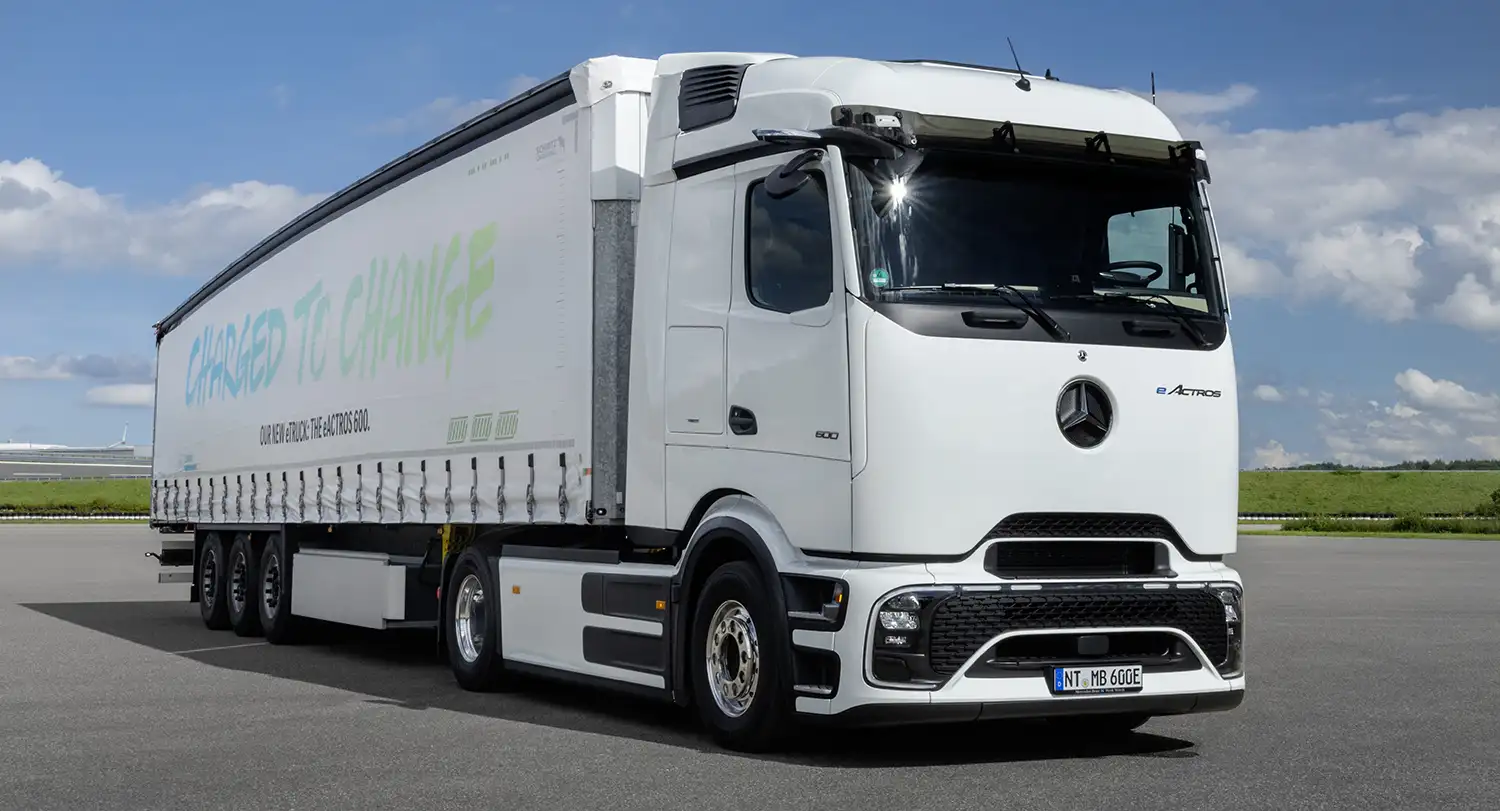
Mercedes-Benz Trucks has unveiled the series version of the first battery-electric long-haul truck with the three-pointed star. The manufacturer presented the
Mercedes-Benz eActros 600 today as a world premiere to an international audience at an event south of Hamburg. With this heavy-duty electric truck, the manufacturer plans to define the new standard in road freight transport – in terms of technology, sustainability, design and profitability for e-fleet operators.
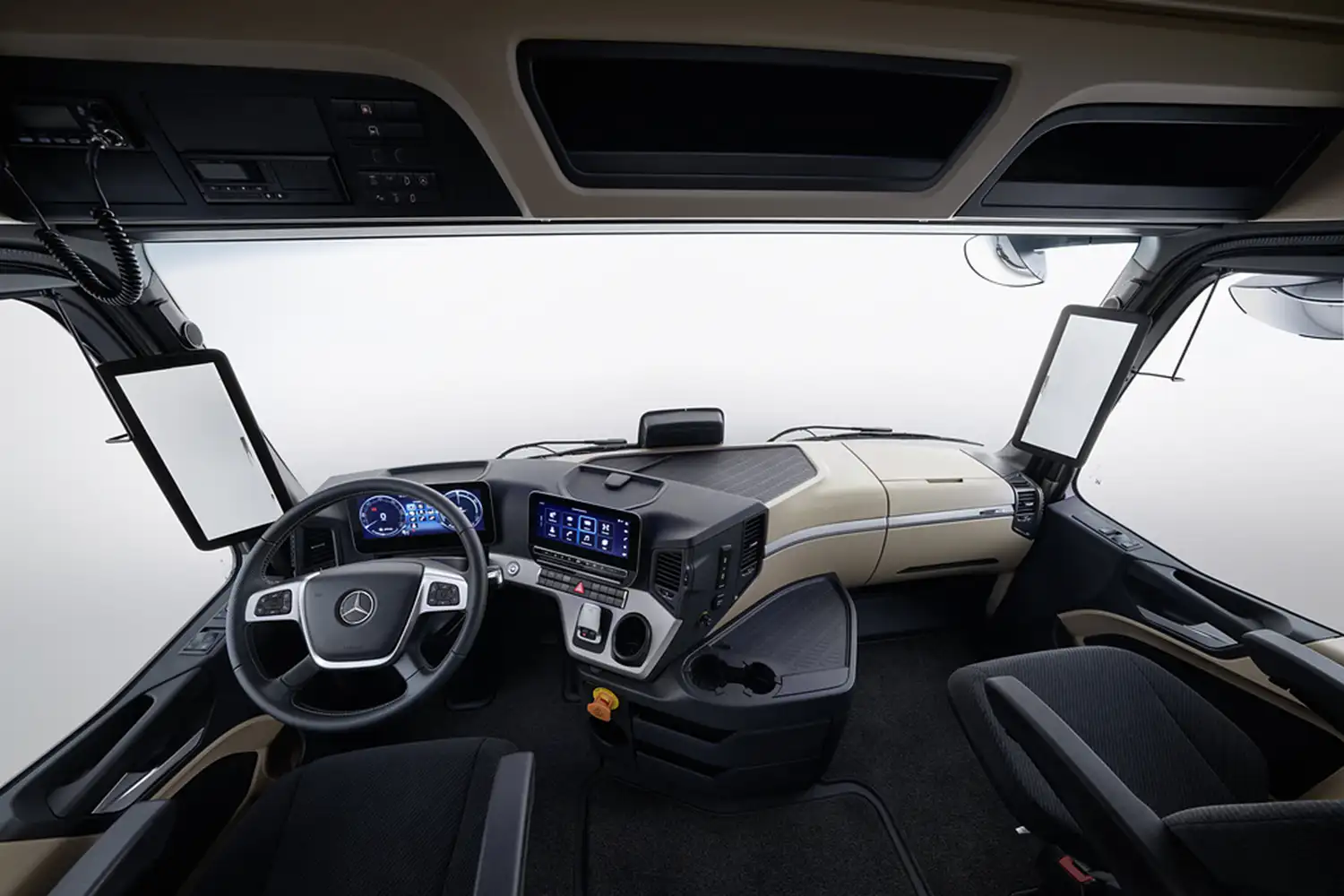
The high battery capacity of more than 600 kilowatt hours – hence the model designation 600 – and a new, particularly efficient electric drive axle developed in-house, enable the e-truck to achieve a range of 500 kilometers1 without intermediate charging. Therefore, the eActros 600 will be able to travel significantly more than 1,000 kilometers per day. This is made possible by intermediate charging during the legally prescribed driver breaks – even without megawatt-charging. Around 60 percent of long-distance journeys of Mercedes-Benz Trucks customers in Europe are shorter than 500 kilometers anyway, which means charging infrastructure at the depot and at the loading and unloading points is sufficient in such cases. For all other uses, continual expansion of public charging infrastructure is vital in order to make the electric truck viable for long-distance haulage across Europe. In addition to CCS charging with up to 400 kW, the eActros 600 will later also enable megawatt charging (MCS). From the start of sales, customers can order a pre-installation for this. As soon as MCS technology becomes available and is standardized across manufacturers, it is planned to be retrofittable for these models of the eActros 600. The batteries can be charged from 20 to 80 percent in about 30 minutes at a suitable charging station with an output of around one megawatt.
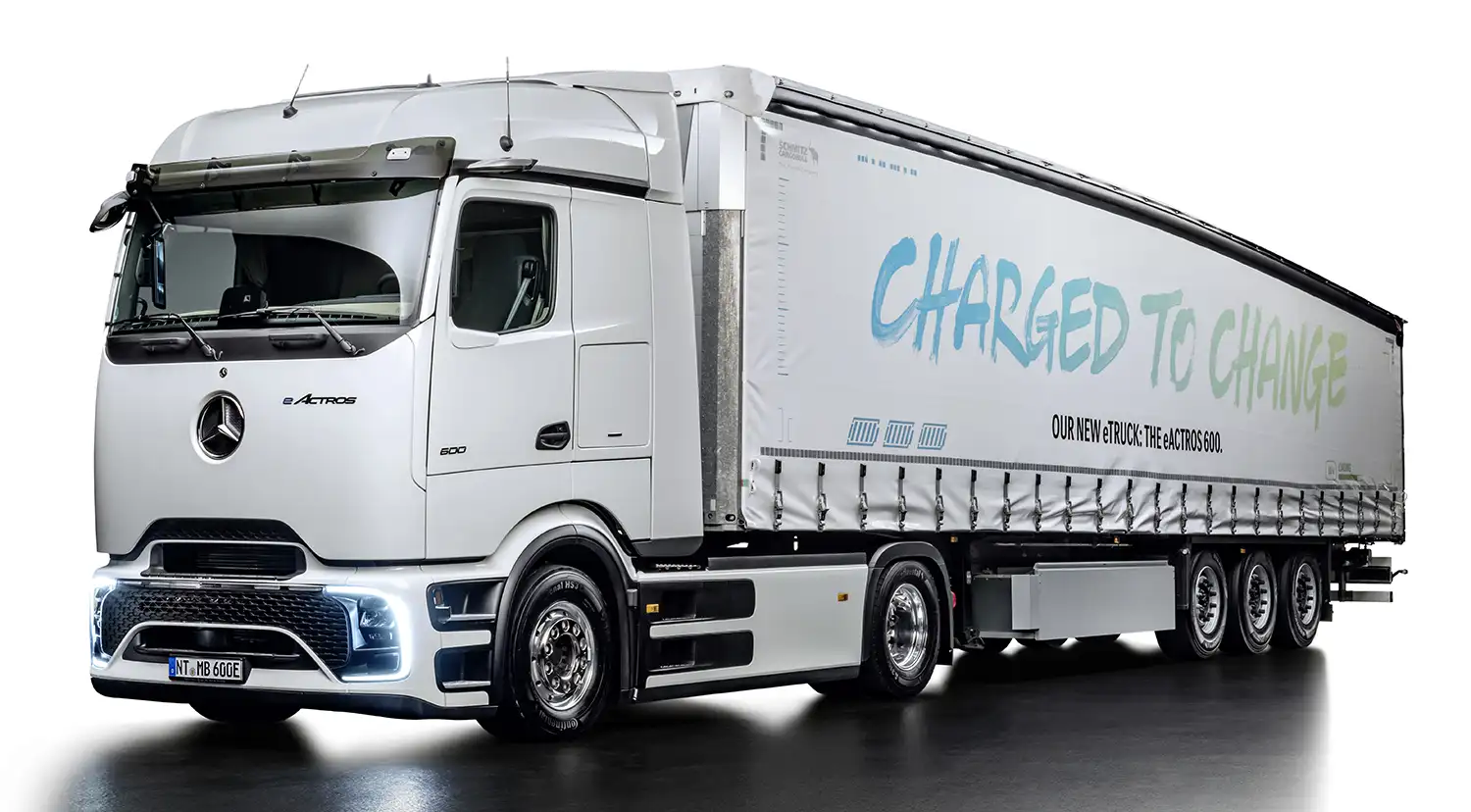
The vehicle is technically designed for a gross combination weight of up to 44 tons. With a standard semitrailer, the eActros 600 has a payload of around 22 tons in the EU. In some cases, national law may permit a higher payload. Visually, the e-truck is characterized by a fundamentally new, puristic design with clear lines and an aerodynamic shape. When it comes to profitability for fleet operators, the electric truck is intended to set new standards, over the long term replacing the majority of diesel trucks in the important long-haul transport segment. The core of Mercedes-Benz Trucks‘ concept for battery-electric long-distance transport is to offer customers a holistic solution consisting of vehicle technology, consulting, charging infrastructure and services.
Sales of the electric truck start this year. The start of series production is planned for the end of 2024. In addition to the tractor unit, Mercedes-Benz Trucks will also produce rigid variants of the eActros 600 right from market launch, offering customers further possible applications for all-electric transport. A fleet of around fifty prototype vehicles is currently being built, some of which are also to be put into practical testing with first customers in a next step.
Karin Rådström, CEO Mercedes-Benz Trucks: “The eActros 600 stands for the transformation of road freight transport towards CO2-neutrality like no other truck with a three-pointed star. It is characterized by highly innovative drive technology that can offer our customers particularly high energy efficiency and thus profitability. This makes entry into e-mobility even more attractive for fleet operators.”
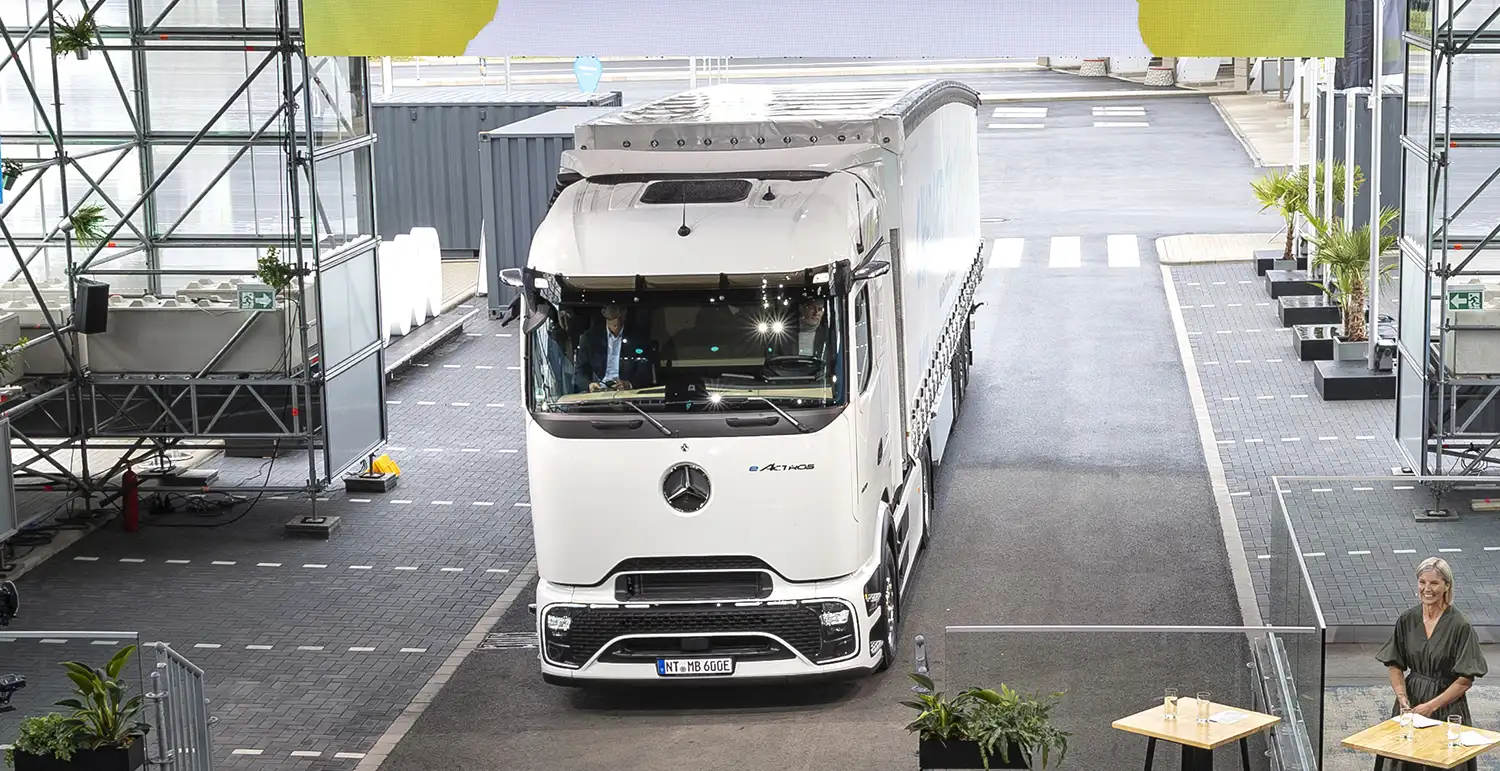
Electricity price and toll system decisive for profitability compared to diesel trucks
The time period within which fleet operators can achieve cost parity with a comparable diesel truck using the eActros 600 in long-distance haulage differs from country to country, in particular depending on the electricity and diesel price and toll system. In the large transit countries of France and Germany, for example, a low electricity price and the planned CO2-based truck toll, respectively, have a positive effect on the operational costs of battery-electric trucks. This means that the eActros 600 can be more profitable than a diesel long-haul truck within the average vehicle holding period of around five years or after around 600,000 kilometers – despite a purchase price that is around two to two and a half times higher than the diesel equivalent. Government subsidization of e-trucks and charging infrastructure is a key lever providing support in ramping up the market.
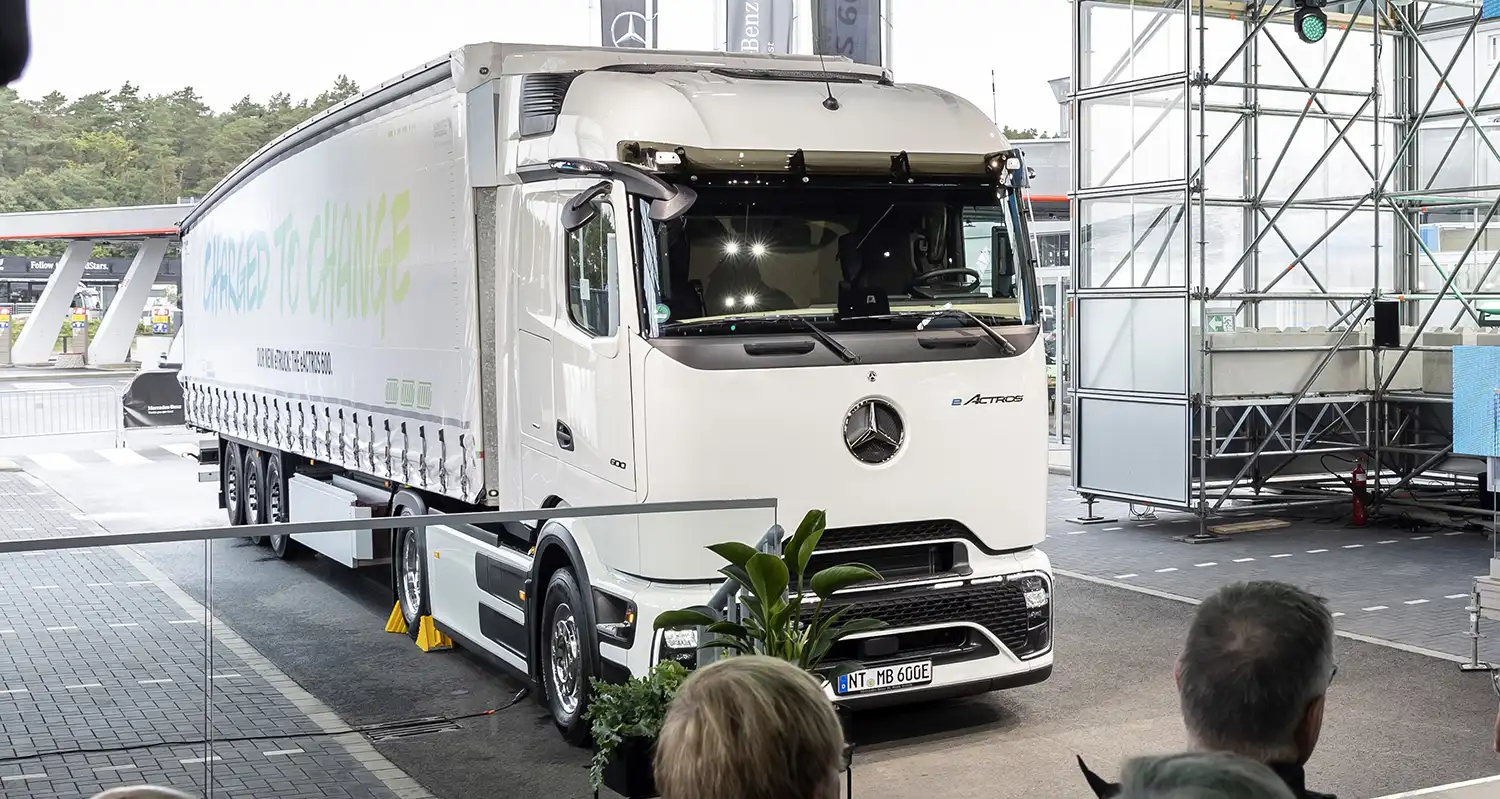
More than 80 percent CO2 savings possible compared to diesel trucks over the entire life cycle
The CO2 footprint of the eActros 600 depends heavily on the electricity mix used for driving operation. With the current European energy mix, the eActros 600 achieves CO2 savings of around 40 percent compared to a comparable diesel Actros and, with fully renewable energies, of more than 80 percent over the entire product life cycle of ten years from raw material extraction. This corresponds to savings of around 370 or 775 tons of CO2. As a result, the eActros 600 can compensate for the higher CO2 footprint ex works due to its batteries within its second or first year of operation in long-haul transport.2
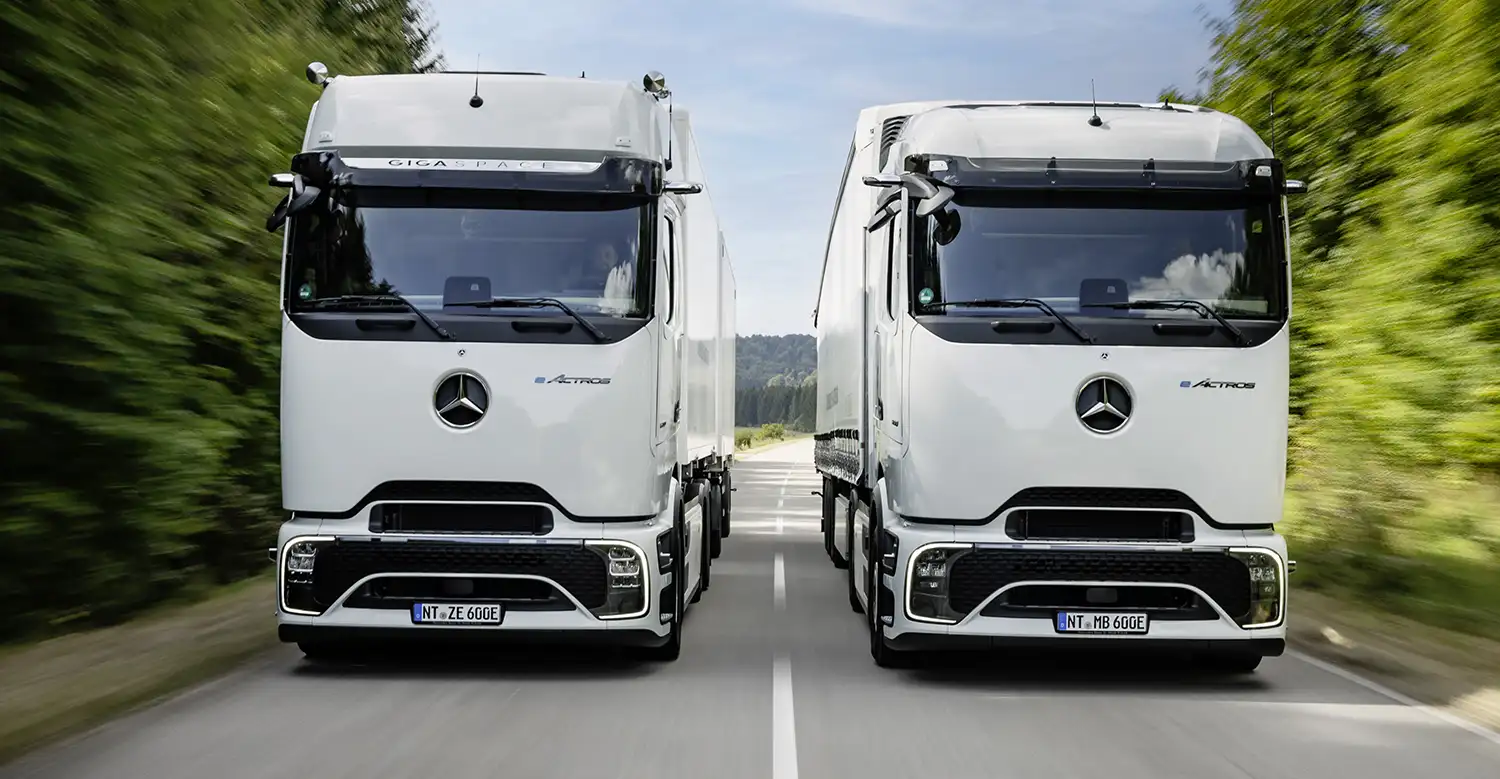
E-mobility in long-distance haulage with various opportunities for fleet operators
The electrification of long-distance trucking will change the business model of transport companies and create opportunities for competitive advantage on several levels. For example, more and more customers of transport companies are attaching importance to CO2-neutral transportation of their goods – providers who cannot meet this requirement will miss out. However, the effects of electrification also go beyond the mere purchase of electric trucks as a replacement for diesels and the build-up of charging infrastructure. Many fleet operators have to calculate very accurately with profit margins in the low single-digit percent range. If, due to lower electricity prices or toll payments, they are able to earn more money with every kilometer driven on electric power than with a diesel truck, it will be worthwhile for them to deploy the eActros 600 for as many orders as possible. This can even be the case if drivers purchase the electricity on the road at a higher price than at their own depot, as the costs may still be generally significantly lower than for diesel trucks. First, this means that the higher investment in the electric vehicle pays for itself more quickly and, second, they can operate increasingly economically in this way.
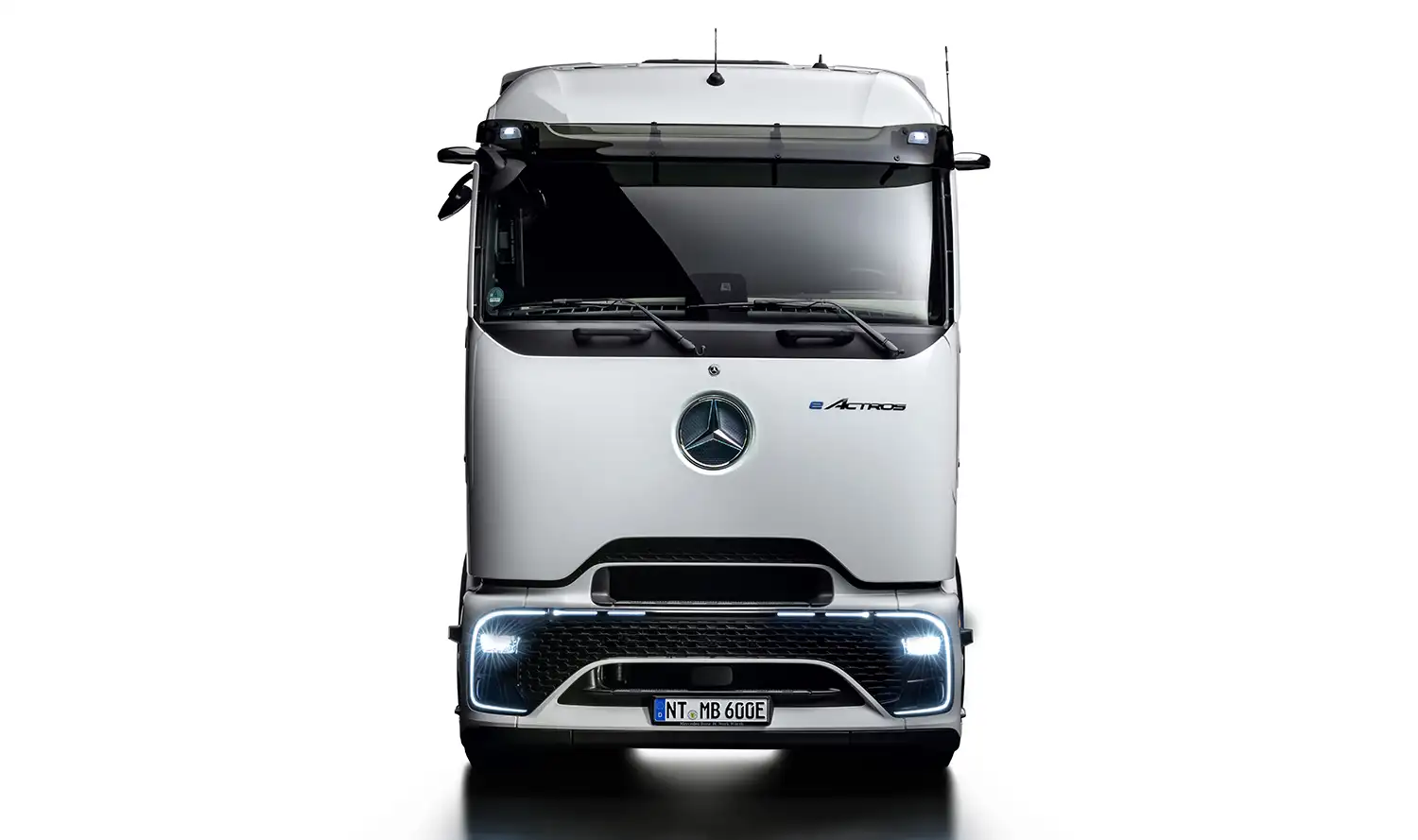
Efficient LFP battery technology
The eActros 600 has three battery packs, each with 207 kWh. These offer an installed total capacity of 621 kWh. The batteries are based on lithium iron phosphate cell technology (LFP) and are characterized by a long service life. The development engineers at Mercedes-Benz Trucks have designed the eActros 600 to meet the same requirements on the durability of the vehicle and components as a comparable conventional heavy-duty long-haul Actros. That means up to 1.2 million kilometers in ten years of operation. After this period of use, the battery state of health should still be over 80 percent. Moreover, in contrast to other battery cell technologies, approximately 95 percent of the installed capacity can be used with LFP technology. This makes a higher range with the same installed battery capacity possible.
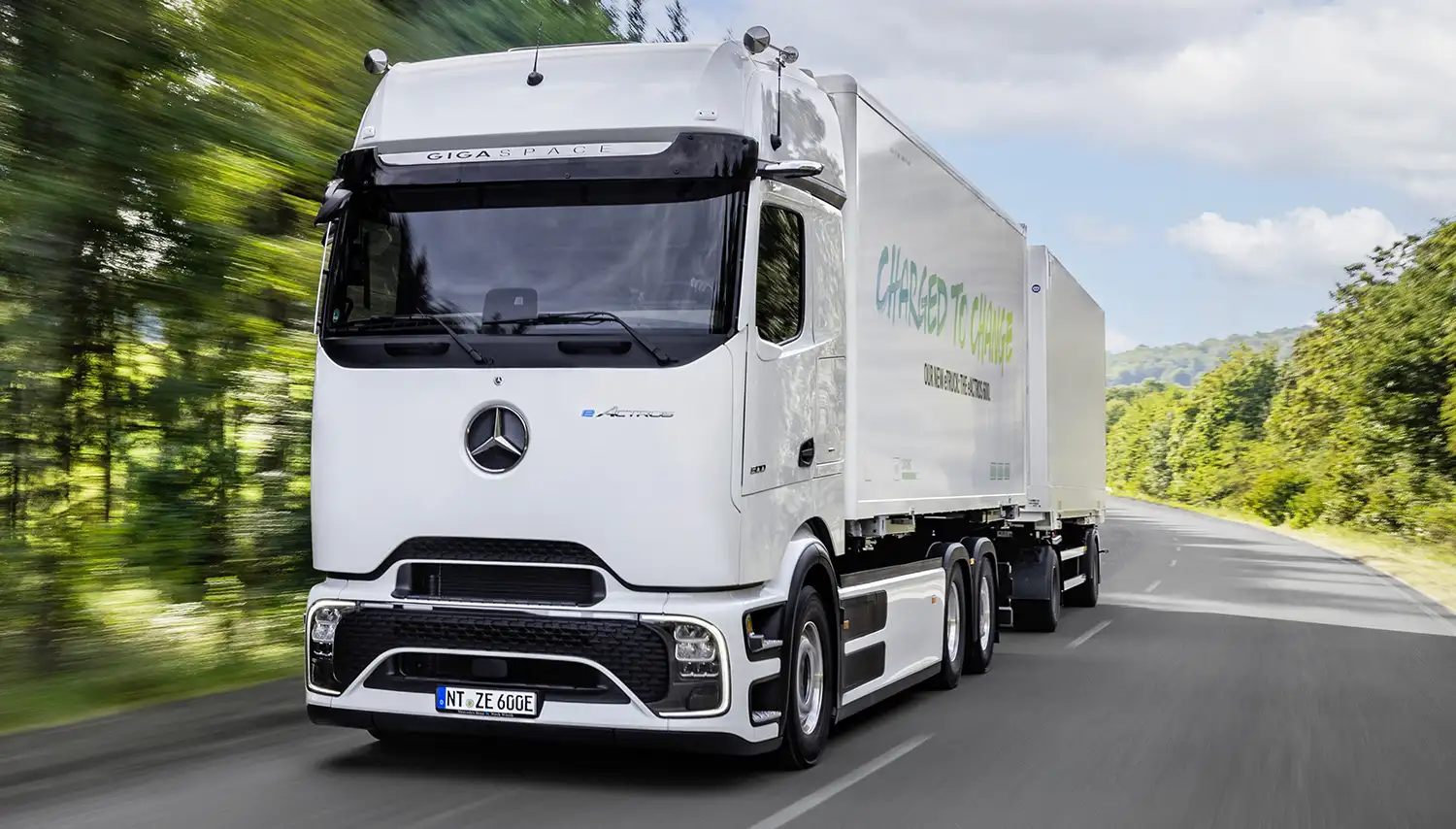
Innovative drive technology – Predictive Powertrain Control in the eActros 600
Mercedes-Benz Trucks has developed a new 800-volt electric axle with two electric motors and a four-speed transmission specifically for use in heavy-duty long-haul transport. The electric motors generate a continuous output of 400 kW as well as a peak output of 600 kW and ensure powerful acceleration, high driving comfort and high driving dynamics. The full motor output is available most of the time with almost no interruption in torque.
In addition, with an anticipatory driving style, electrical energy can be recovered through recuperation, which is fed back into the batteries of the eActros 600 and is then available again for the drive system. Recuperation puts less strain on the brakes of the eActros 600, which is a positive side effect. Depending on the situation, the driver can choose between five different recuperation levels. One-pedal driving can also be optionally enabled on the touchscreen in the digital cockpit – i.e. deceleration by means of recuperation with reduced actuation of the mechanical brake.
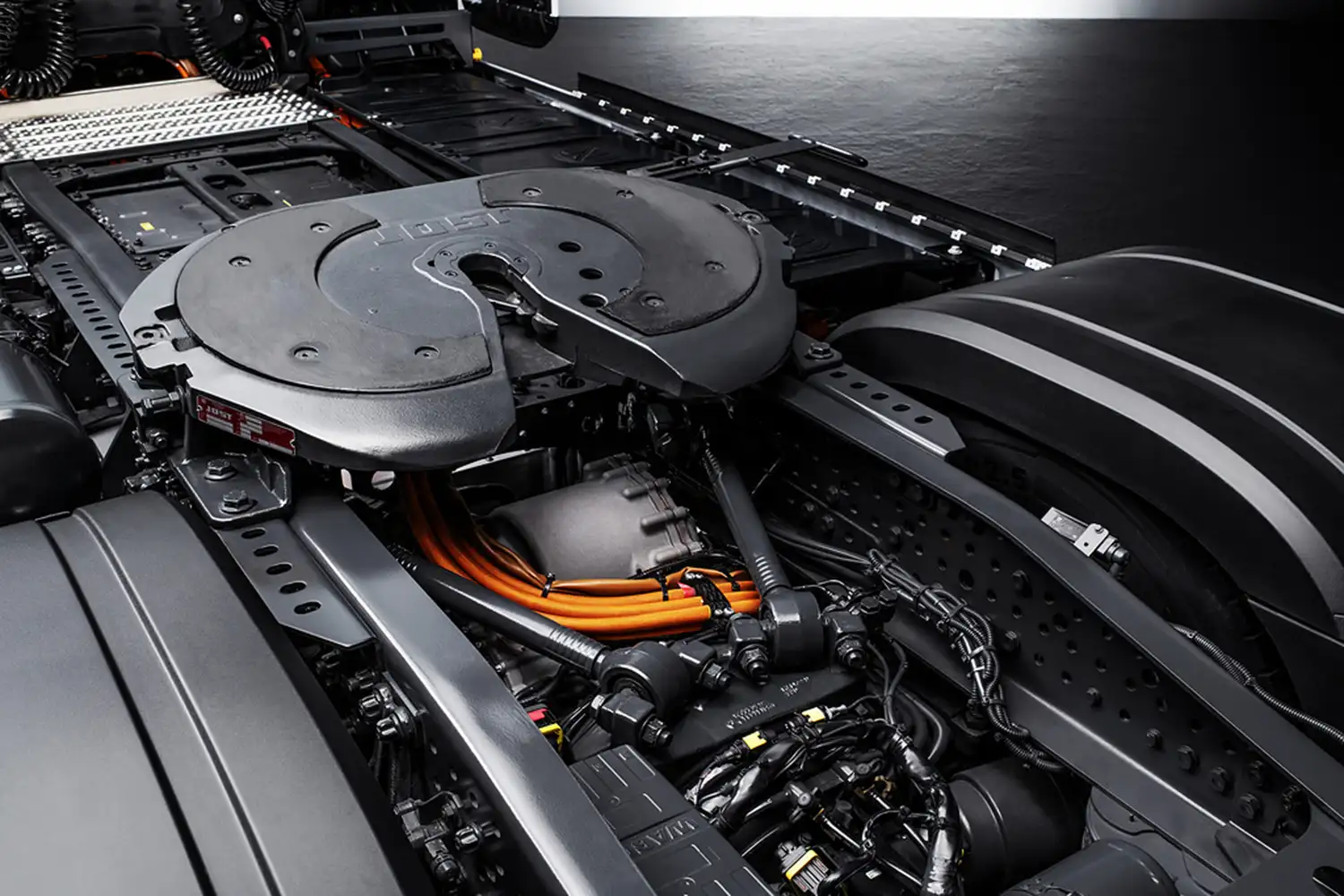
The eActros 600 features the tried-and-tested Predictive Powertrain Control (PPC) cruise and transmission control, which is specially tuned to the electric drive system. The anticipatory drivetrain control automatically takes into account the topography, course of the road and traffic signs for the most efficient style of driving. Route information from the navigation system is now included to facilitate better recognition of the situation on the road ahead. This allows the driver to avoid unnecessary braking, accelerating and shifting and to exploit the battery energy as efficiently as possible.
Via the Multimedia Cockpit Interactive 2 installed as standard in the eActros 600, the driver is continuously informed about the charge level of the batteries, the remaining range as well as the current and average energy consumption. Fleet managers can use digital solutions for efficient management of their fleet via the Fleetboard Portal. These will, right from the start, include an individually developed charge management system, such as smart control of all processes between the eActros 600 and the charging infrastructure, as well as a logbook with detailed information on driving, standing and charging times as well as consumption data. There will also be a mapping tool that shows in real time where a vehicle is currently located, whether it is driving, stationary or charging, and how high the battery charge level is.
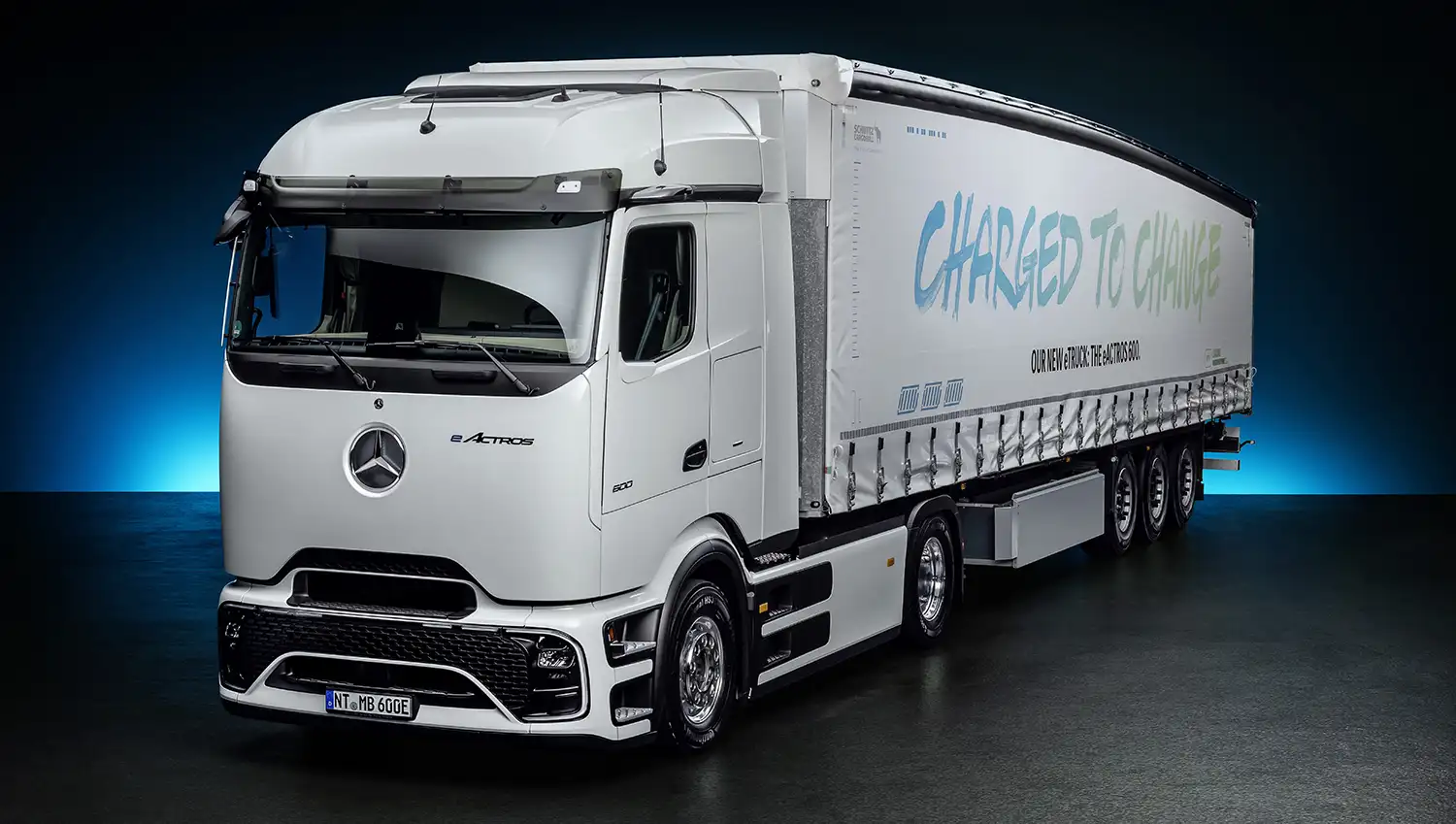
New aerodynamic design of the driver’s cab
The new design language of the driver’s cab of the eActros 600 is characterized by particularly efficient aerodynamics. This is achieved with the large, completely closed and rounded-off front hood, an optimized bumper, including underbody paneling, an aerodynamically improved driver access and extended end flaps designed like sails. Air deflectors on the A-pillars, an additional spoiler on the roof and a sealed motor compartment complement the aerodynamic improvements to the cab. Over and above this, the cab is equipped with aluminum step plates, a new headlamp concept with matrix LED headlamps and an LED light strip. Mercedes-Benz Trucks markets the cab under the “ProCabin” name.
Specifically with battery electric trucks in long-haul operation, improved aerodynamics are of decisive importance as air resistance is one of the main factors influencing energy consumption. In addition, reduced air resistance means that more energy can be recovered through recuperation, leading to a longer range.
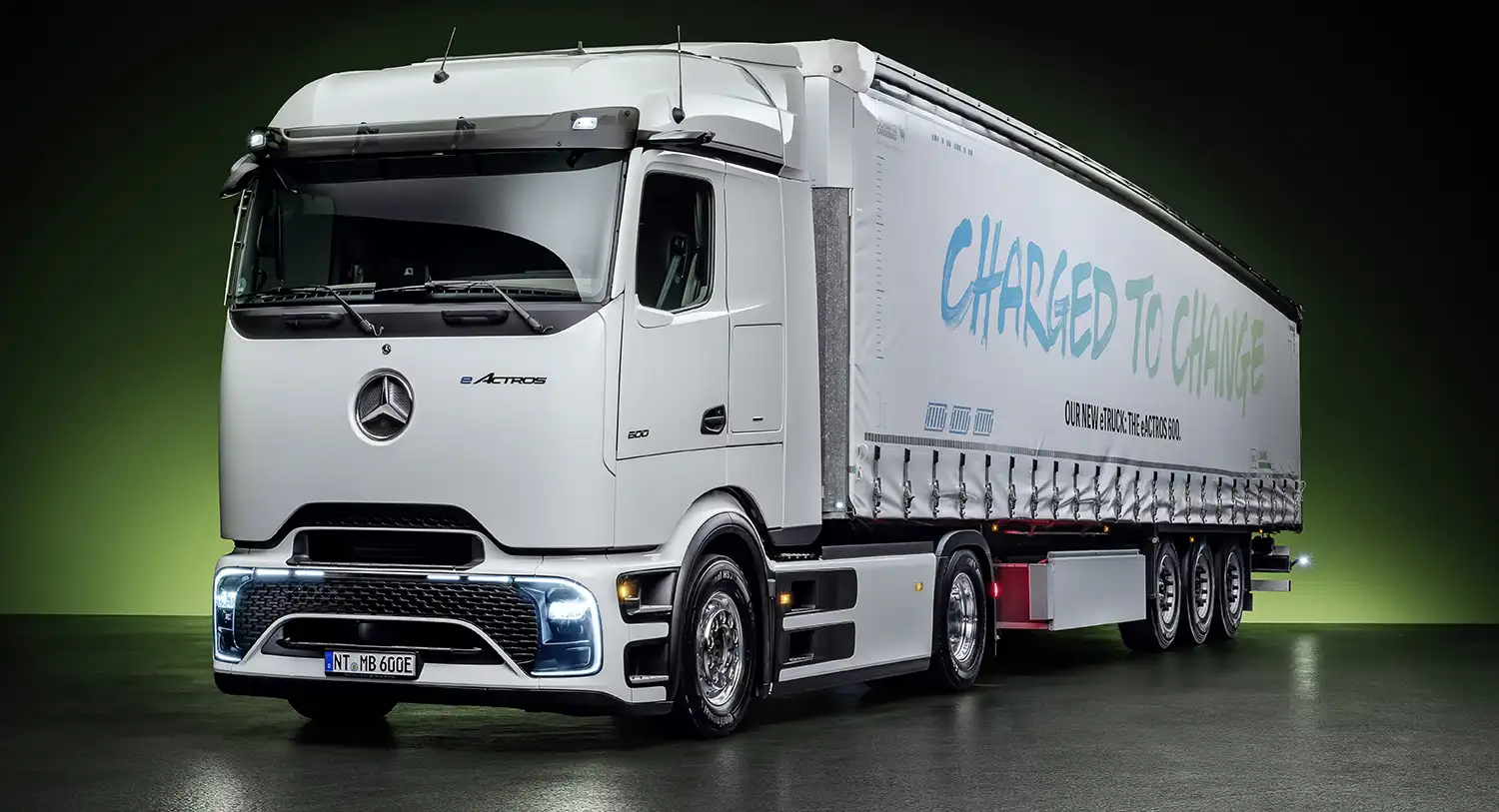
Extending the front by 80 millimeters made it possible to achieve the particularly aerodynamic shape of the new cab. This streamlined shape was developed in a multitude of in-house air-flow simulations as well as wind tunnel and on-the-road measurements. This enabled the ProCabin’s cW value to be lowered by nine percent in comparison to the Actros cab currently in series production. This aerodynamic improvement reduces the vehicle’s energy consumption and makes a decisive contribution to the range of 500 kilometers1 achieved by the eActros 600.
Power take-offs for work equipment or refrigerated semitrailers
Mercedes-Benz Trucks has developed two power take-offs for the eActros 600. The electric-mechanical power take-off makes it possible, for example, to operate hydraulic or mechanical work equipment such as tipping, sliding floor or silo semitrailers. Another solution is the electric DC or AC power take-off. In the case of the latter, an inverter converts the direct current from the high-voltage network into alternating current. This means that solutions for refrigerated bodies or refrigerated semitrailers can be operated, for example. Depending on the version, the various power take-off applications cover a power range from 22 to 90 kW, thus serving all common uses in long-distance and distribution transport. Today’s tried-and-tested standard industrial interfaces will remain available ex works in the eActros 600. The advantages of these solutions compared to previous diesel-based operation are in particular the local CO2-neutrality as well as the greatly reduced noise generation, which is particularly relevant for use in cities and residential areas. The compact design of the systems still allows the eActros 600 to be operated as a semitrailer tractor with standard semitrailers – a great added value for transport operators who use the vehicle for a wide range of applications.
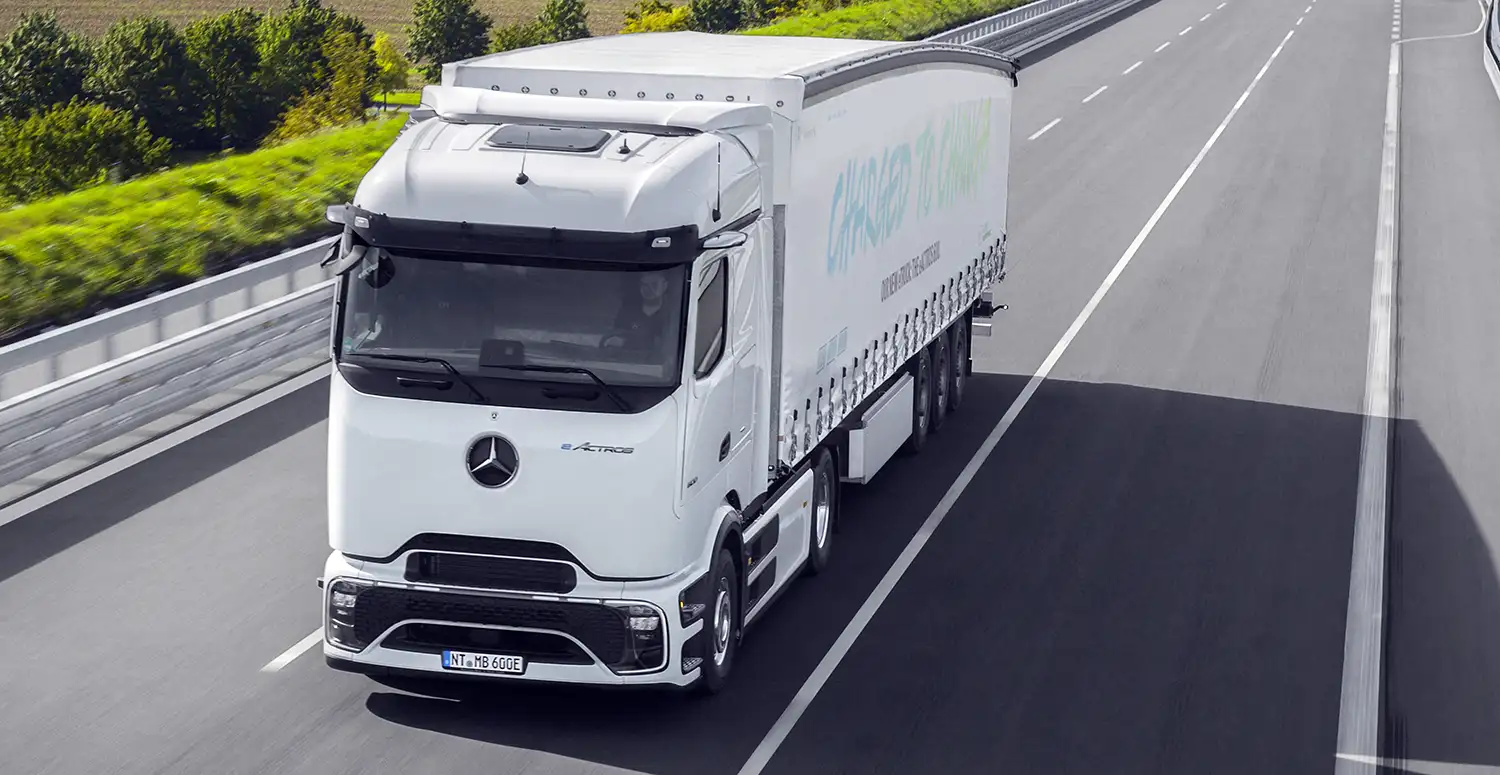
Futuristic sound design for the acoustic warning system
The eActros 600 is very quiet on the road for the benefit of the driver and its environment. To ensure that, for example, vulnerable road users such as pedestrians or cyclists can still notice the electric truck in their surroundings, it is equipped with an external Acoustic Vehicle Alerting System (AVAS) in accordance with legal requirements. Depending on the driving conditions, sounds are played for forward or reverse travel. In addition, the sound varies depending on the vehicle speed and accelerator pedal position, so that good acoustic perception is possible in urban traffic. The futuristic sound spectrum of the AVAS in the eActros 600 is designed to take into account the appearance of a heavy vehicle and to contribute to better recognizability in urban traffic.
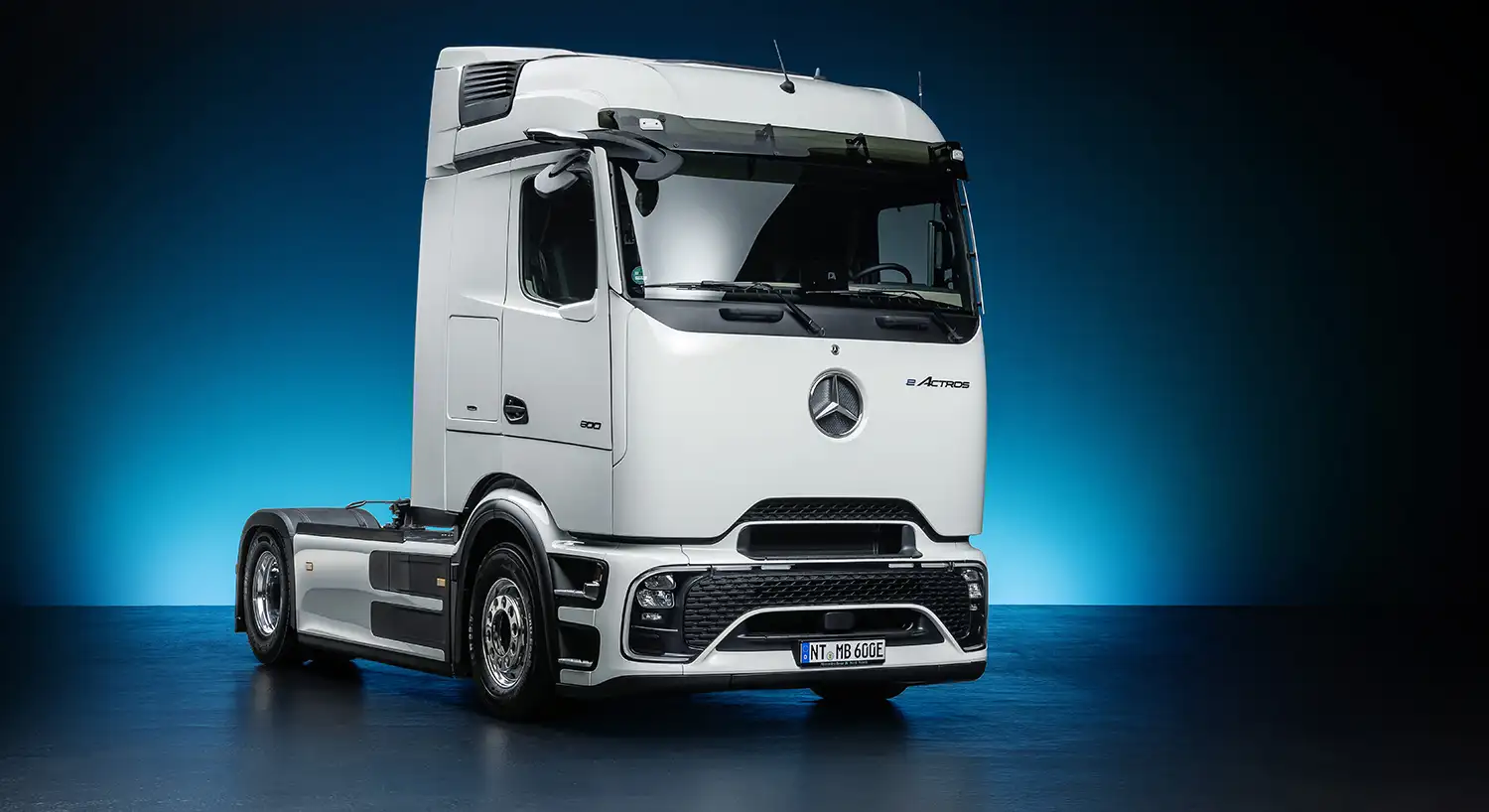
New milestones for safety assistance systems
With the eActros 600, Mercedes-Benz Trucks is advancing its vision of accident-free driving. As was the case in previous years with the manufacturer’s vehicles, the installed safety assistance systems go beyond the legal requirements in many areas. This also applies to the General Safety Regulation adopted by the EU Commission. From mid-2024, the regulation prescribes the addition of systems as standard equipment for all new vehicles. The safety concept of the eActros 600 is based on the further development of tried-and-tested safety assistance systems. The basis for this is a completely new electronics platform which involves what is known as sensor fusion to merge radar and camera data for an even larger view to the front and side. For this purpose, the electronics platform offers 20 times higher data processing. The total of six installed sensors – 4 short range radars and one long-range radar – as well as the multifunction camera in the windshield cover an angle of 270 degrees around the vehicle.
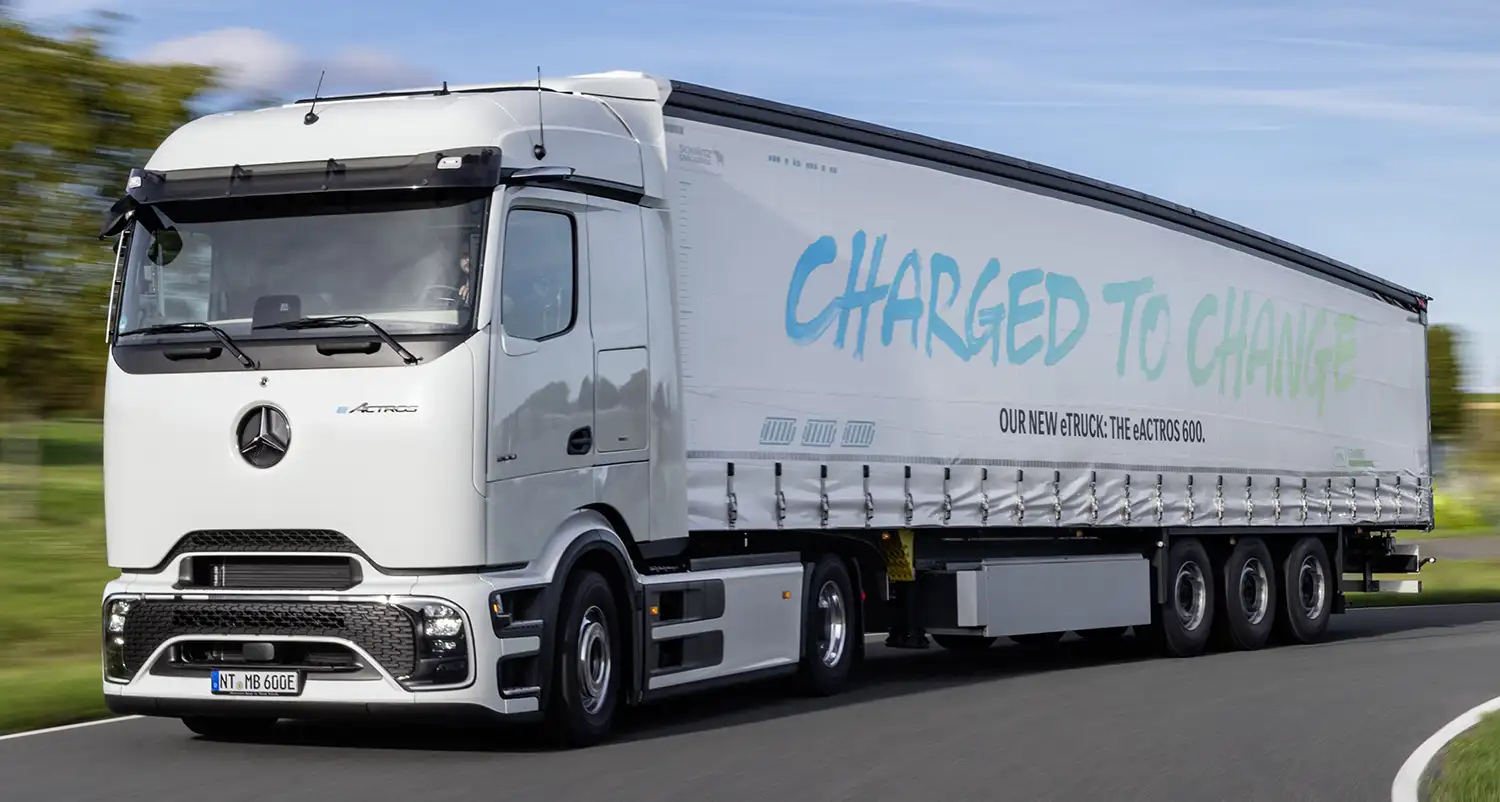
Sensor fusion offers benefits for all safety assistance systems installed in the eActros 600
The significantly enlarged angle of vision increases the efficiency of the respective safety assistance systems – including Active Brake Assist 6 (ABA 6), Frontguard Assist, Active Sideguard Assist 2 (ASGA 2) and Active Drive Assist 3 (ADA 3) – even further. Thanks to higher data processing and the networking of all sensors, valuable time can be gained in order to react as quickly as possible to traffic conditions where necessary and ideally to avoid accidents completely or at least mitigate their consequences.
The sensor fusion or the 270-degree view with six sensors, in particular with the ABA 6, has the great advantage that, thanks to the improved hazard recognition and multiple-lane monitoring, the emergency brake assistance system is able to react more quickly in critical situations such as changing lanes or stationary ends of traffic jams in curves typical for highways.
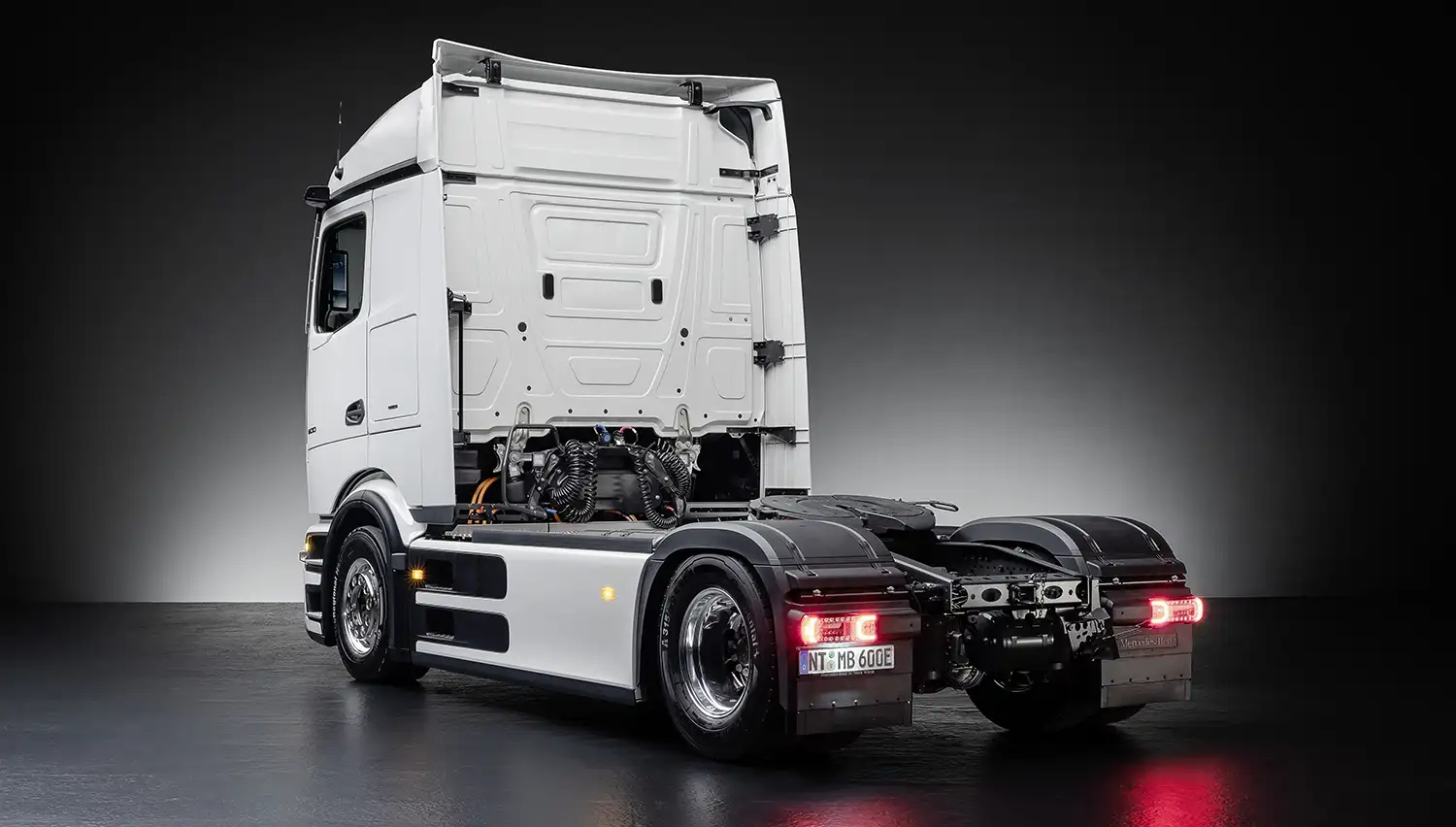
ABA 6 is able to react not only to moving persons and cyclists, whether in the same lane, crossing or oncoming, but also stationary pedestrians, with automated emergency braking from up to a vehicle speed of 60 km/h. Furthermore, the new Frontguard Assist can warn the driver visually and acoustically of vulnerable road users directly in front of the truck, especially in hectic situations such as when pulling away or at junctions.
While the ASGA 1 monitors the length of the entire tractor/trailer combination plus two meters to the front and up to one meter to the rear as well as up to 3.75 meters to the right adjacent to the vehicle, the sensor fusion increases the monitoring range with the ASGA 2 to up to seven meters to the front, 30 meters to the rear and 4.25 meters to the right. In addition, the ASGA 2 has a new monitoring zone on the driver’s side.
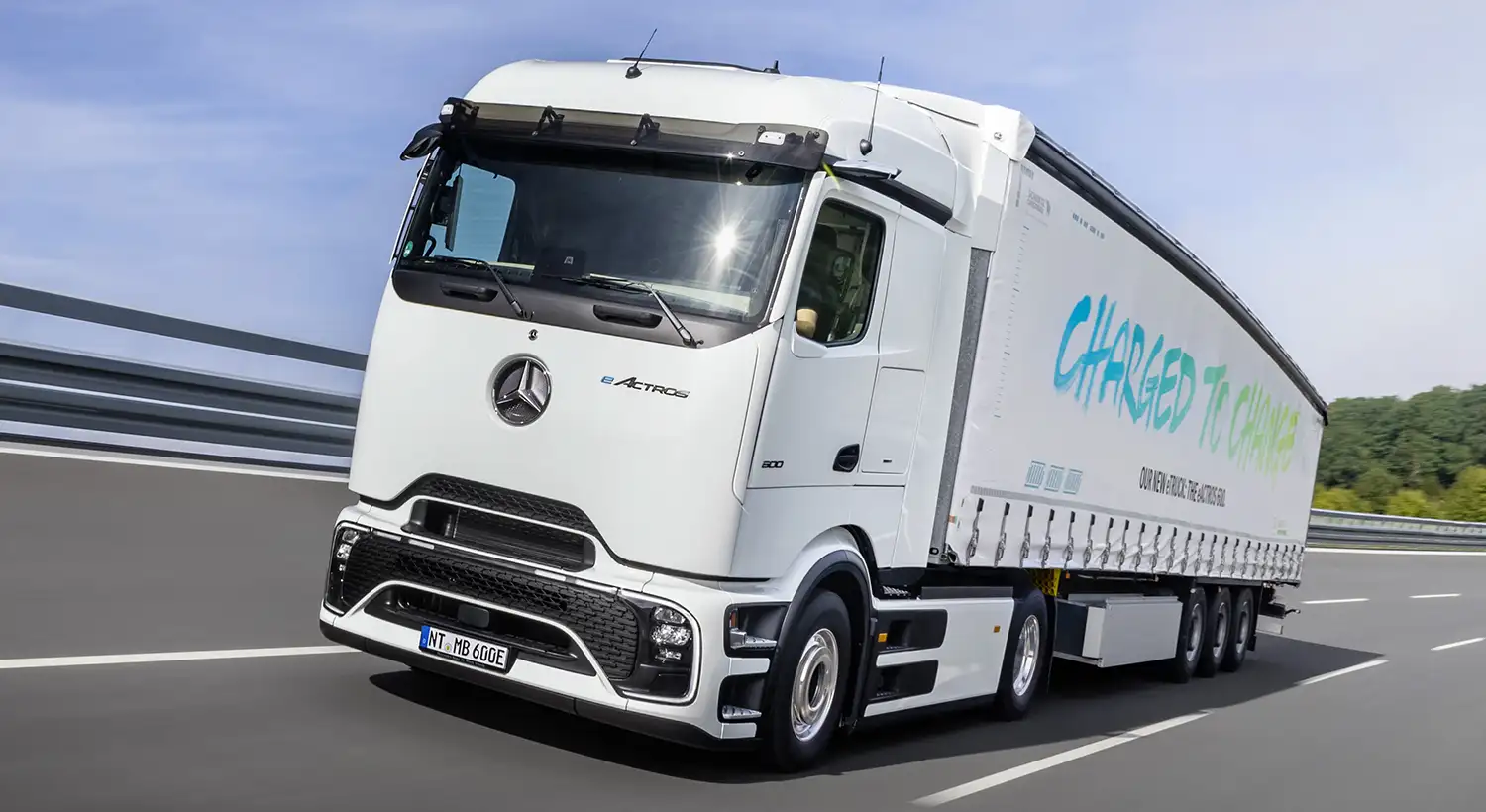
The extension of the viewing angle to the left is also associated with a significant added value with the installed ADA 3, which allows semi-automated driving (level 2): The now third generation of the system is able to automatically guide the truck back into its lane if there is a risk of collision when, for example, the driver wants to steer off to the left to overtake but has missed a vehicle approaching from behind.
Intelligent services
Mercedes-Benz Complete, the most comprehensive service plan in the manufacturer’s portfolio, is available for the eActros 600. This always includes the Mercedes-Benz Uptime fully automated telediagnosis system. It monitors the status of various on-board systems in the truck in real time which can allow critical conditions to be detected. Unplanned workshop visits can be reduced by bundling identified repair and maintenance requirements. Predictable causes of breakdowns can be detected at an early stage and to a great extent avoided with the assistance of the Daimler Truck Customer Center.
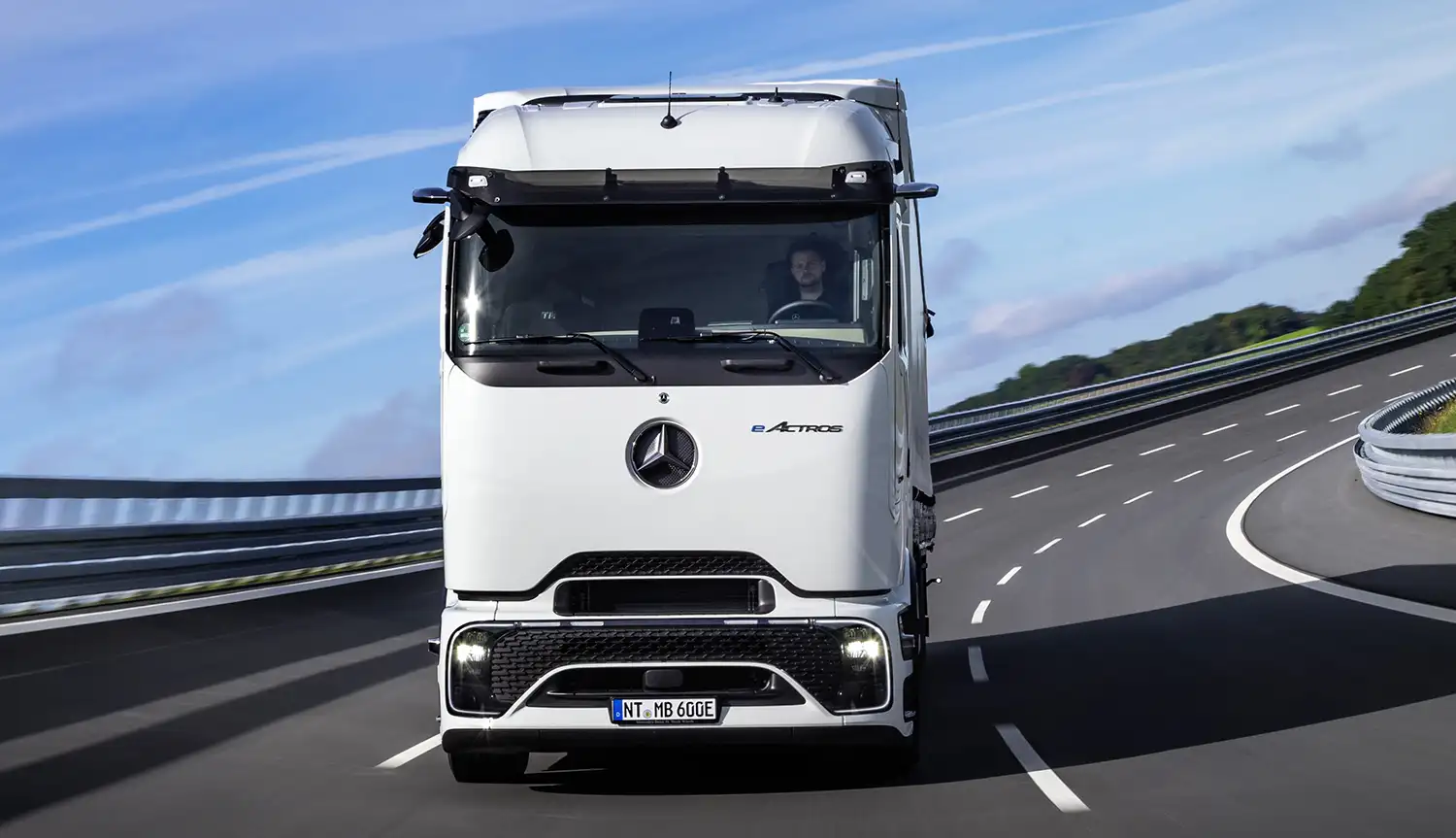
Via the My TruckPoint customer portal, transport companies can activate the digital service TruckLive. TruckLive is the central point of entry to the digital service world and links customers to their vehicles and the respective Mercedes-Benz Trucks partner. The service currently comprises the two features “Maintenance Management” and “Live Traffic”. “Maintenance Management” offers the customer improved maintenance planning through maintenance intervals being forecast in real time as well as transparency on the status of their vehicles, from brake wear through to tire pressure. Thanks to the use of real-time traffic data, “Live Traffic” makes it possible to reduce journey times and plan arrival times more precisely.
For charging e-trucks at public charging stations outside of the customer depot, Mercedes ServiceCard will also offer an eCharge card as an extension to the already existing MSC fuel card from the launch of the eActros 600. This means Mercedes ServiceCard will remain a processing partner for cashless billing of charging costs in the future.
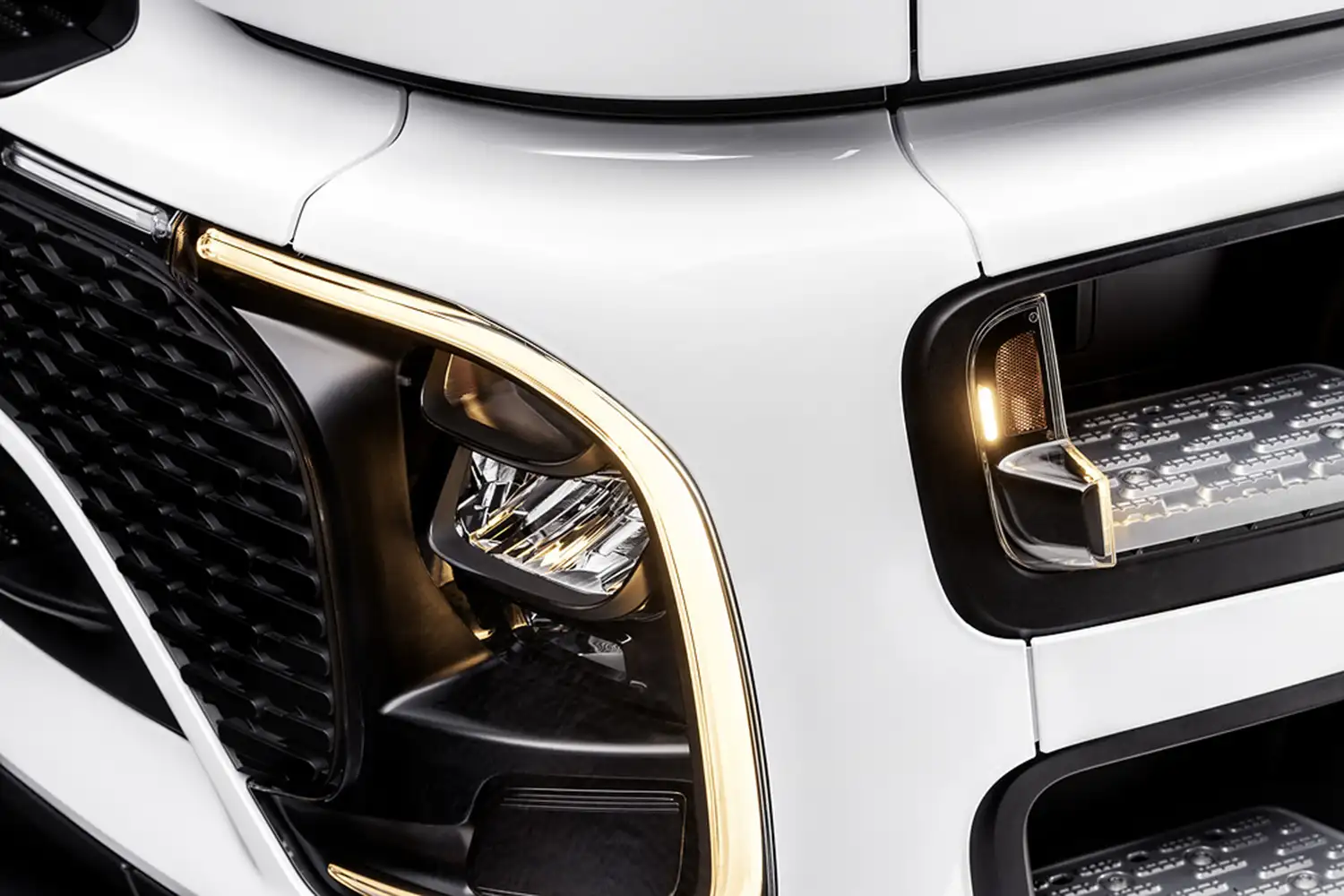
End-to-end consulting and services on electrification of fleet and depot
With its “eConsulting” range of consulting services, which constitutes part of the comprehensive ecosystem for improving total costs relating to e-trucks, Mercedes-Benz Trucks already provides support for customers with electrification of their fleets and depots. In this context, the focus is on consulting for the right electric truck but also planning, construction and configuration of the depot charging infrastructure and connection to the grid. In addition, the consultants from Mercedes-Benz Trucks can assist with identifying potential public subsidies for infrastructure and vehicles. For the depot design, Mercedes-Benz Trucks teams up with selected partners. The manufacturer intends to consistently expand the range of services. From mid-2024 on, Mercedes-Benz Trucks is, for example, going to sell chargers at its dealerships and offer a professional service to ensure a seamless charging process and vehicle uptime. The objective is to offer customers a cost-efficient overall package, from energy generation through to suitable charging infrastructure, to enable their entry into e-mobility. For this purpose, Mercedes-Benz Trucks will extend its partner network throughout Europe.
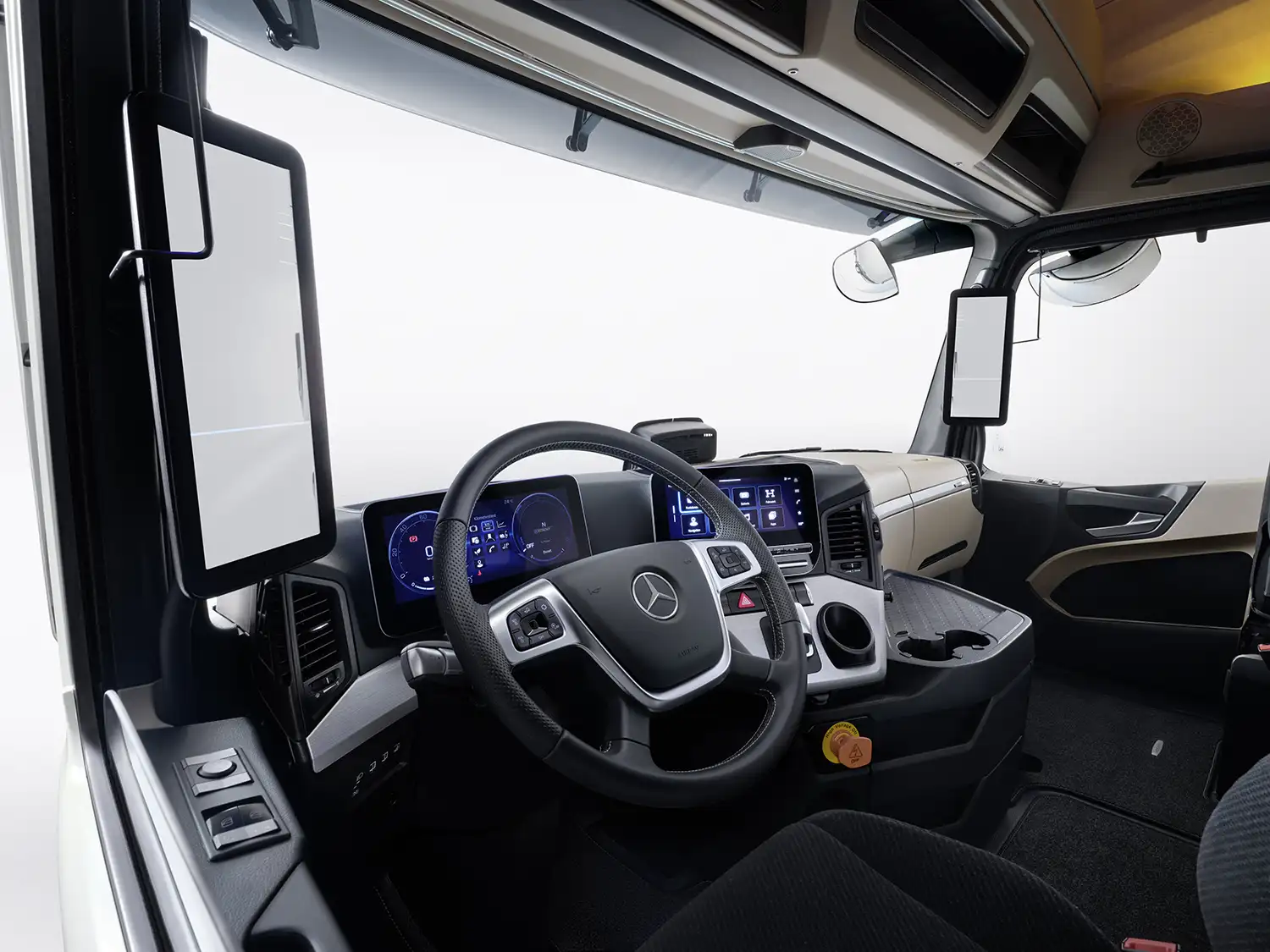
Financial services from a single source
The transformation to sustainable transport is supported by integrated financing and insurance solutions for both the eActros 600 and the charging infrastructure. Financing offers cover all products ranging from mere use with integrated services through to ownership. In addition, Daimler Truck Financial Services cooperates with Marsh, who are in their own words the world’s leading insurance broker negotiating effective and affordable insurance products and offering services tailored to customers’ business needs.
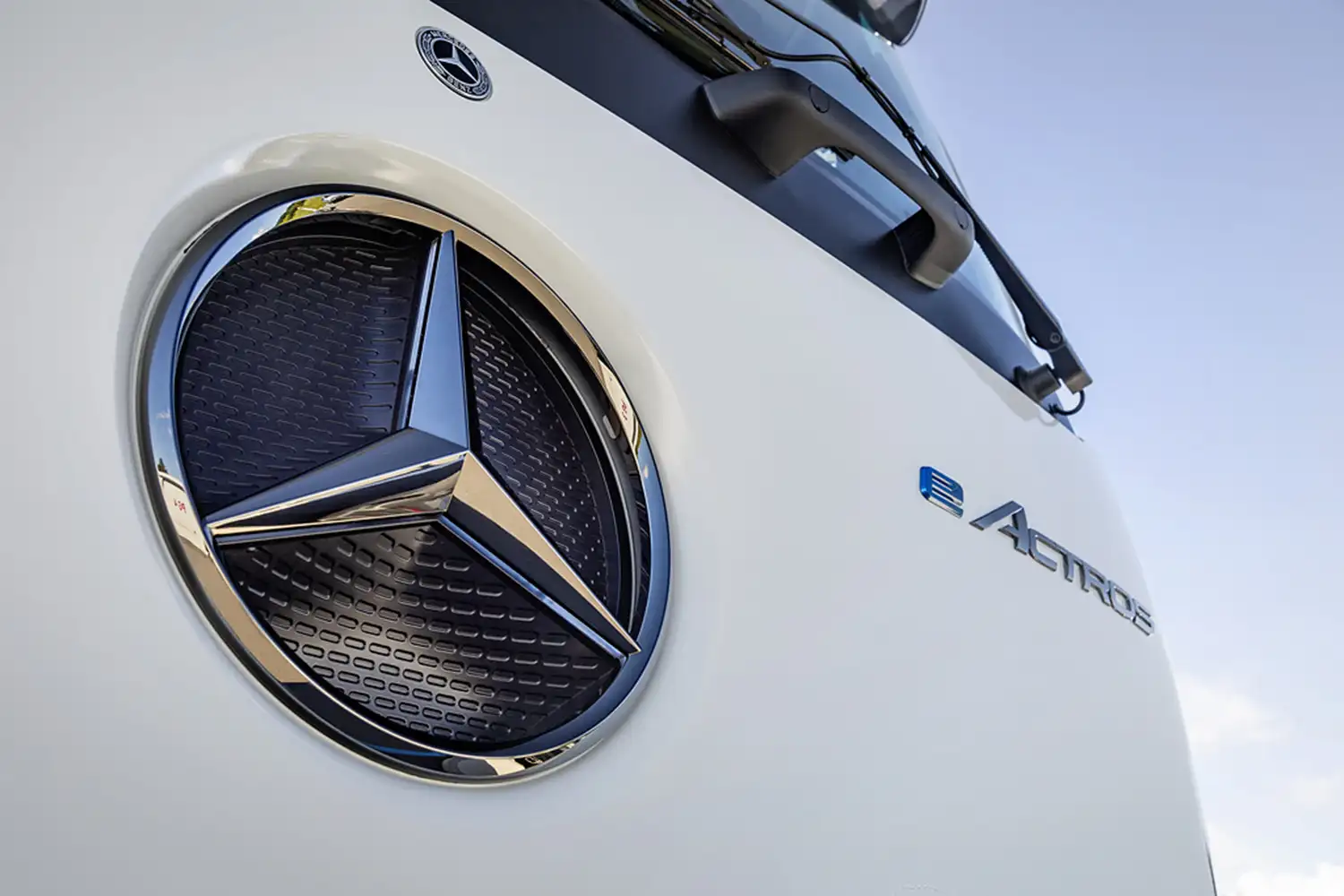
Production aligned to sustainability and flexibility
The eActros 600 will be produced on the existing assembly line at the largest truck assembly plant of Mercedes-Benz Trucks in Wörth am Rhein – in parallel to and flexibly alongside the trucks that will continue to be equipped with a diesel drive. In Wörth, it will also be equipped with the electric drive components from the Mercedes-Benz plants in Mannheim, Gaggenau and Kassel. Like the Wörth site, the three locations are also undergoing a transformation from diesel technology to competence centers for emission-free transport. Installation in Wörth takes place in several production steps, including the installation of the electric axle, the high-voltage batteries and the front box, which is a complex technology module with several control units, high-voltage components and an electric air compressor. Once all high-voltage components have been installed, the entire system goes into operation and the truck is ready to drive.
The world premiere of the eActros 600 took place at the Break Autohof Hamburg Nordheide directly at the A7 highway in Egestorf.

The post Mercedes-Benz eActros 600 (2024) appeared first on Wheelz.me-English.




